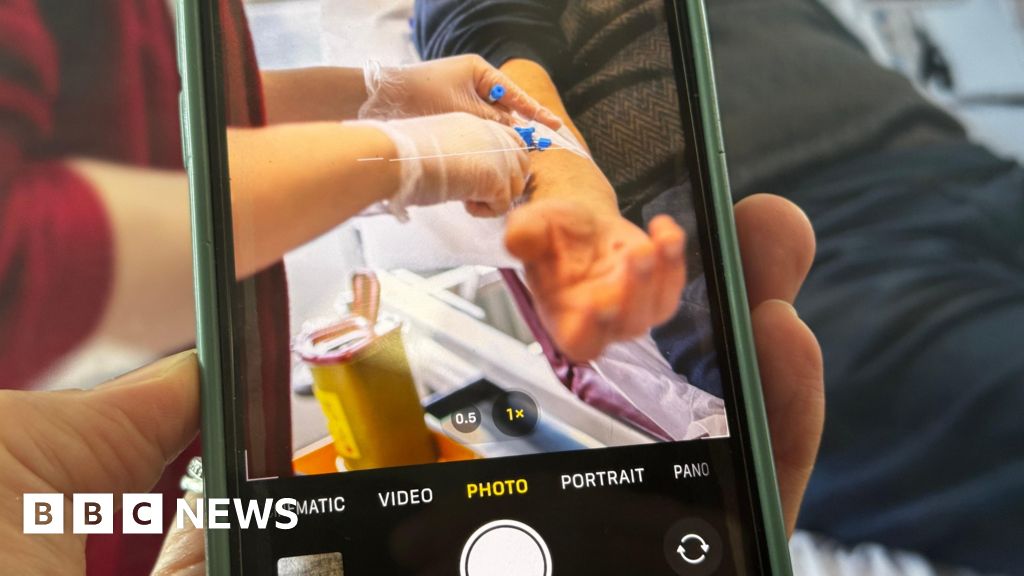Patients who film their own medical treatment for TikTok or Instagram could be putting themselves and NHS staff at risk, the Society of Radiographers (SoR) has warned. The trade union's annual conference heard that more patients were videoing their procedures on mobile phones, often without asking permission. This could distract staff or make them feel uncomfortable and anxious, the society said. Sharing material on social media also risks publicising the private medical data of other people who may be in the same room or area of the hospital. "I had one patient whose relative started filming while I was trying to set up," said Ashley d'Aquino, a therapeutic radiographer from London. "It wasn't the right time - I was trying to focus on delivering the treatment." Ms d'Aquino, who is also a local union representative, said she had recently been contacted by other colleagues in a similar situation. "We had a member of staff who agreed to take photos for a patient," she said. "When the patient handed over her phone, the member of staff saw that the patient had also been covertly recording her, to publish on her cancer blog." Most NHS staff wear identity badges and their names and job titles may be visible on videos posted online. The union said another of its members, a department assistant from the south coast of England, was inserting a cannula as part of a cancer procedure, when the patient's 19-year old daughter started filming on her phone. "She thought it would be entertaining on social media but she didn't ask permission," said the member of staff. "I spent the weekend afterwards worrying: did I do my job properly? I know I did, but no-one's perfect all of the time," she added. "I don't think I slept for the whole weekend." Ms d'Aquino said there were valid reasons for patients to record the audio of medical consultations - so they could listen back to the detail, for example. "The difficulty is that our phones have become so much a part of our day-to-day life that recording and sharing has become second nature," she added. Dean Rogers, the director of strategy at the SoR, is calling for NHS trusts to have clear policies in place that stop patients from filming without permission. "As healthcare professionals, we need to think: does that recording breach the confidentiality of other patients? Does it breach our ability to deliver care?" he said. "There are hospital trusts that have very good policies around patients taking photos and filming procedures but this is something all trusts need to have in place." Prof Meghana Pandit, co-national medical director at NHS England, said it was vital that, if patients want to record any part of NHS care, they discuss it with staff first and it remains for their personal use only. "Recording other patients inadvertently and without their permission risks breaching patient confidentiality – the information and treatment provided to other patients on NHS premises should never be recorded, let alone posted to social media," she added.
Warning over TikTok filming by hospital patients
TruthLens AI Suggested Headline:
"Concerns Raised Over Patient Filming of Medical Treatments in NHS Settings"
TruthLens AI Summary
The Society of Radiographers (SoR) has raised concerns about patients filming their medical treatments for social media platforms like TikTok and Instagram, highlighting the potential risks to both patients and NHS staff. During the trade union's annual conference, it was noted that an increasing number of patients are documenting their procedures without prior consent from healthcare professionals. This practice not only distracts staff during critical moments but can also create an uncomfortable atmosphere for both patients and medical personnel. For instance, therapeutic radiographer Ashley d'Aquino shared her experience of being filmed by a patient's relative while she was preparing for treatment, emphasizing how such interruptions hinder the delivery of care. Additionally, there are serious privacy implications, as video recordings could inadvertently reveal private medical information about other patients present in the same vicinity. Many NHS staff members wear identification badges that could be captured in these videos, raising concerns about their personal privacy as well.
In response to these issues, Dean Rogers, the SoR's director of strategy, has called for NHS trusts to establish clear policies regarding patient filming. He emphasized the importance of maintaining confidentiality and ensuring that the ability to provide care is not compromised by unsolicited recordings. Some healthcare professionals have reported feeling anxious after being filmed without permission, worrying about how their actions might be perceived when shared online. Prof. Meghana Pandit from NHS England echoed these sentiments, stressing that any recording should be discussed with staff beforehand and should remain for personal use only. The overarching message from the SoR is the need for a balanced approach that allows patients to document their experiences while safeguarding the privacy and dignity of all individuals receiving care within NHS facilities.
TruthLens AI Analysis
You need to be a member to generate the AI analysis for this article.
Log In to Generate AnalysisNot a member yet? Register for free.
